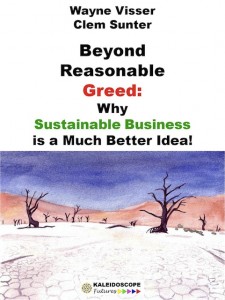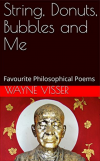Reformation and Pragmagic
Chapter by Wayne Visser
Extract from Beyond Reasonable Greed
As we write this introduction we are very conscious of magic. Magic, it seems, is a catchy theme right now, both in our own lives and in the world around us. This is hardly surprising, what with J.R.R. Tolkein’s Lord of the Rings and J.K. Rowling’s Harry Potter stories having come to life on the big silver screen. But the magic we are talking about is not of the wizardry kind. Merlin can stay in his cave. Nor is it of the David Copperfield genre where the audience knows that they’re being hoodwinked but are prepared to suspend their belief in the interests of excitement. No, we are talking about something more genuine, more tangible, more practical – what brain-mind researcher Marilyn Ferguson called ‘pragmagic’.
In our interpretation of the word, magic is the revelation that results from a profound change in perception or understanding. The superstitious world of the Middle Ages was magically transformed by the wizards of art and science – Da Vinci, Galileo, Copernicus and Newton. Then the quantum physicists waved their wands and subtly altered Newton’s clockwork universe. Today, the magic continues as the seemingly impossible is conjured up with breakthroughs in areas like biotechnology, artificial intelligence and human consciousness.
But magic is not restricted to the sciences. Nelson Mandela and F.W. de Klerk weaved their own form of magic to create the New South Africa. Unlike in art and the sciences where the magic is normally provided by individuals working on their own, the magic in politics often comes from the development of a positive chemistry between the leading players. This chemistry then leads to an outcome greater than the contribution of any individual member and takes them all by surprise.

Nevertheless, as with everything in life, there’s good magic and bad magic. The Swastika was bad magic. When Hitler unfurled it, he temporarily turned the most scientifically advanced nation on Earth back into savage barbarians. In his footsteps followed Stalin, Mao and Pol Pot who turned their followers into killing machines of their own people. By the millions. And the chemistry was pure evil. Today bad magic continues to bedevil regions like the Middle East and Northern Ireland where thirst for revenge plunges ordinary people into acts of lunacy and callousness. In the name of God or Allah. And He is always on your side.
What, you may be asking, has all this to do with business? Well, magic has everything to do with business and this book. For the simple reason that bad magic has moved many companies into a state that is beyond reasonable greed. And the public have a good idea of the boundary between ‘reasonable’ and ‘obscene’. Recently, in South Africa, we have had several disclosures on the size of individual packages and the terms of share incentive schemes which have caused tremendous hue and cry. They have been clearly out of wack with the norm. To give companies the benefit of the doubt, they may not have consciously exceeded the limits of reasonableness. Their boards probably comprise the normal spectrum of saints and sinners; but somehow they have allowed themselves to be collectively swept along by the prevailing paradigm of success which is purely financial, and that in turn has led to unreasonable behaviour. …
Continue reading
[button size=”small” color=”blue” style=”download” new_window=”false” link=”http://www.waynevisser.com/wp-content/uploads/2012/04/book_brg_chap1_introduction.pdf”]Pdf[/button] Reformation and Pragmagic (chapter)
Related pages
[button size=”small” color=”blue” style=”info” new_window=”false” link=”http://www.waynevisser.com/books/beyond-reasonable-greed”]Page[/button] Beyond Reasonable Greed (book)
Cite this chapter
Visser, W. (2002) Reformation and Pragmagic, In W. Visser, Beyond Reasonable Greed: Why Sustainable Business is a Much Better Idea! Cape Town: Tafelberg Human & Rousseau, 11-17.
Love this page
Click on the pink heart in the heading if you LOVE this page
Share this page
 This creative collection, now in its 3rd edition, brings together philosophical poems by Wayne Visser. In this anthology, he muses on subjects ranging from space, angels and destiny to time, science and meaning in life. According to scientists / The world’s made of string / That buzzes and fuzzes / Or some such strange thing / It’s also a donut / That curls round a hole / With middles and riddles / Just like a fish bowl / And there’s no mistaking / It’s more than 3-D / With twenty or plenty / Dimensions unseen / Still others insist / It’s really a bubble / That’s popping and bopping / Through the lenses of Hubble. Buy the paper book / Buy the e-book.
This creative collection, now in its 3rd edition, brings together philosophical poems by Wayne Visser. In this anthology, he muses on subjects ranging from space, angels and destiny to time, science and meaning in life. According to scientists / The world’s made of string / That buzzes and fuzzes / Or some such strange thing / It’s also a donut / That curls round a hole / With middles and riddles / Just like a fish bowl / And there’s no mistaking / It’s more than 3-D / With twenty or plenty / Dimensions unseen / Still others insist / It’s really a bubble / That’s popping and bopping / Through the lenses of Hubble. Buy the paper book / Buy the e-book.


